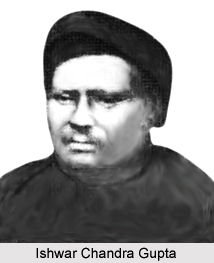 The importance of Ishwar Chandra Gupta (1812-59) is historical rather than intrinsic. Gupta was born in the village Kanchanpolli or Kanchrapara. He started the newspaper Sambad Prabhakar along with Jogendra Mohan Tagore in the year1831. He reintroduced the mediaeval style with double meaning into Bengali poetry.
The importance of Ishwar Chandra Gupta (1812-59) is historical rather than intrinsic. Gupta was born in the village Kanchanpolli or Kanchrapara. He started the newspaper Sambad Prabhakar along with Jogendra Mohan Tagore in the year1831. He reintroduced the mediaeval style with double meaning into Bengali poetry.
Early Life of Ishwar Chandra Gupta
Ishwar Chandra Gupta`s walk from innocence towards experience in the early ages was marked by his uncle`s house after the death of his mother spending most of his time at Kolkata. At that time, poets were named Kobiwala and the kobiwalas were hardly extravagant with efficiency in language. Sexual words and clashes were common. But Ishwar Chandra Gupta created a completely different style of poetry.
Works of Ishwar Chandra Gupta
A journalist by profession, he wrote on current affairs and mundane interest. He often emulated Bharat Chandra. Deriving his characteristic method from folk-poetry, the cunning wit and the racy language of the social squibs caned from the platform of his folk poetry. He achieved popularity due to this. The drollery and doggerel also came from this. As a satirist he had material for ridicule in the transitional society of his time. His ultra-conservative attitude made him laugh at everything that was new irrespective of whether it was beneficial or bad. This may be because he had grown up in the old ways without Western influence. He is the last of the Kaviwala type of poet. However he is not completely devoid of modernity. He is conservative and a traditionalist by nature and upbringing. Throughout his journalistic work one gets the feel of current affairs and modern movements. He struck out a new path by writing on matters of social and public interest and everyday subjects.
He reintroduced into Bengali poetry the mediaeval style with double meaning (already seen in Sandhyakaranandi and Bharatchandra): "Ke bole Ishwar Gupta, byapta charachar,
Jahar prabhaye prabha paye Prabhakar." Ishwar` means God, `Gupta` means hidden and `Prabhakar` is the sun.So a translation runs: "Who says God is hidden? He is omnipresent
From Him the Sun gets its luminescence." One of the most attractive things in his works was the love for his country, its literature and culture. The patriotic note is prevalent that was altogether new in Bengali literature. In the first half of the century there was a threat as anglicized Bengali youth turned against the nation. It was Ishwar Gupta who brought them back to the national literature and culture. Many young men took to writing in Bengali under his direction and encouragement. His influence was conservative, retrograde and salutary. He has also penned many biographies of many Bengali poets and musicians.
He was conservative as he had opposed opposing the Young Bengal movement as well as frowning on widow remarriage. He was one of the earliest advocates of a traditional view of Indian society. However later it changed. His works include: Life of Bharat Chandra Roy, Probodh Pravakara and Kobitabolir Saar Sangraha.



















